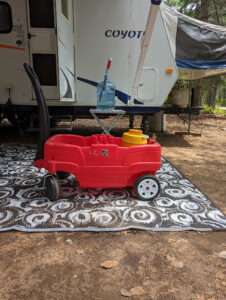What does is really cost to brew your own beer?
Some people have asked me if homebrewing beer is cheaper than buying beer. My answer has simply been “No, I totally lose out on economy of scale. It is cheaper to go to my favourite craft brewery and buy off the shelf”.
Something I became acutely aware of while brewing the Mountain Portage series, was the water requirements, as I would have to wagon in 5 gallons of water at a time, and cart away 21 gallons once weekly. What was towed away was not exclusively just grey-water. No further elaboration.

I have indicated in some other posts, I am sure every science teacher I have ever had, is cringing that I am mixing my metric/imperial and other units. I got my diploma, I don’t really care anymore 😃
The Water
Since my city of Thunder Bay water bill is calculated by cubic meters, I will show my work in the metric system. I will also do some convenient rounding off (and up) of some values to keep things easy. The numbers that will be used for calculations will be in bold font.
- The goal of each batch of beer is to end up with approximately 4L of wort. So I have to start with approximately 7.5L to account for what the grain absorbs along with what is boiled off in one hour.
- Fully cleaning of the carboy on brew day is 4L for sanitising, another 4L for for the rinse (I am not going to try figure out the cost of heating the water, lazily anticipating that the rounding up of some numbers brings me close)
- Cleaning up the stock pot, and other brew day messes takes approximately 8L.
- On bottling day, sanitising and rinsing the bottles consumes approximately 6L.
- Rinsing the goo (that is the technical term) and other ick (another technical term) out of the carboy after bottling requires approximately 4L
Water consumption is a whopping 33.5 litres. Much to my surprise that is only $0.06.
Brew Day
Now the cost of the grain bill / mash / boil / fermentation process (switching back to imperial here, try keep up)
- Each batch consumes approximately 2 Lbs of assorted grain, at approximately $3.25 per pound, for a total of $6.50.
- During the boil, approximately 1 oz of hops is added, at approximately $1.00 per ounce.
- Once the wort is cooled, it has to be added to the carboy with approximately 4 ml of brewers yeast. This costs approximately $2.20 .
This part of the process is the second most costly part, totalling $9.70.
The net yield, if all goes well, is 6 bottles of beer. The cost so far is $9.76. If I were to stop here, that is $1.63 per bottle, almost ⅔ more than what some premier promised beer would sell at. Buck a beer? My Aunt Fanny!
Bottling Day
The cost I sort of absorb, since I can clean and reuse the bottle. Each plastic bottle is worth approximately $1.00 . So a six pack is worth $15.76. Or $2.63 per bottle. Well, in those terms that is cheaper than the $3.50 I would normally pay for a bottle of craft beer.
But wait, there is more
There are fixed costs and some consumable costs of homebrewing I did not factor into the production cost. For instance, the stock pot for mashing/boiling, (spoken like a French sentry) we already have one, the carboy & airlock system, the siphon & hose combo, the scrub brush, the small amounts of corn sugar for bottling, the food safe sanitiser to keep everything clean, plus other things I am sure.I am missing. I didn’t add these to the price.
The Time & Effort
Speaking of things NOT being added to the price. The labour. Something each home crafter, painter, knitter, etc cannot truly add to the price of their handiwork, their time. A normal brew day takes approximately 5 hours start to finish. It is not all “labour”, it is a lot of sitting and waiting with infrequent monitoring. Bottling day takes approximately 30 minutes. At Ontario’s (sic) generous $15.50 minimum wage, that is $85.25. Now add that to our six pack price. We are up to $101.01 or $16.84 per bottle. Ain’t nobody, myself included, gonna pay that for a bottle of British style ale containing an ABV of 5.5%. (I will not even bother to calculate this based on what my employer pays me per hour) This is the most costly part of the homebrewing that just doesn’t scale well with the small batch process.
The Conclusion, Finally
If I had the purchasing power to buy in larger volumes, I could significantly reduce the cost, that is where I truly lose out on the economy of scale. The actual cost of materials for a 6 pack I am brewing is reasonable. But just as home crafters who express their talent, homebrewing is also a labour of love, and one cannot truly put a price on that.

 To provide the best experiences, we use technologies like cookies to store and/or access device information. Consenting to these technologies will allow us to process data such as browsing behaviour or unique IDs on this site. Not consenting or withdrawing consent, may adversely affect certain features and functions.
To provide the best experiences, we use technologies like cookies to store and/or access device information. Consenting to these technologies will allow us to process data such as browsing behaviour or unique IDs on this site. Not consenting or withdrawing consent, may adversely affect certain features and functions.